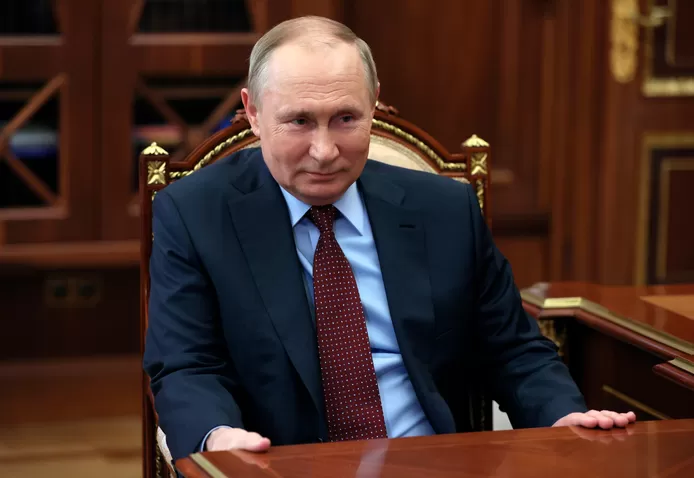The invasion of Ukraine should have lasted three days, and Russia most likely regrets 3000 soldiers who died. That is the view of data researchers from Bellingcat, the research collective that follows the war with its own methods.
US President Joe Biden’s claims — that Vladimir Putin had been looking for a reason to actually attack Ukraine for weeks and would do so on a specific date — were much more than games of psychological warfare, Christo Grozev believes. He is one of the mainstays of the journalistic investigative collective Bellingcat, founded by British blogger Eliot Higgins. Bellingcat had similar leads last year, only they came directly from a Russian whistleblower.
Grozev, a Bulgarian investigative journalist, media expert, and media investor, talked about it yesterday in a webinar for international colleagues. Everyone out there would like to look inside Vladimir Putin’s head about whom Grozev casually remarks that the Russian president may well be ill. Bellingcat has unparalleled expertise in investigating open-source intelligence and leaked data, and has an impressive track record of reconstructing the MH17 drama as the ultimate feat.
What do Bellingcat data specialists know about this Russian offensive? Grozev says he saw this invasion coming ‘in slow motion’. Because of the profile of his organization, people came to him last year. Also, agents of the FSB (the Federal Security Service of Russia – formerly KGB) who already told him that things would change in Russia in 2022 ‘like never before’.
Russia would become a full-blown dictatorship, and the country would be run like an army, Grozev heard. “Those were valuable insights, but we couldn’t confirm them. We had an idea of what was going on in the Kremlin when another person came to us announcing war with Ukraine and also that Putin was considering deploying tactical nuclear weapons if necessary. Everyone in the Kremlin was terrified about all that, except a small group of the military elite. Only him now trusts Putin. No longer the wider elite, the oligarchs who are traditionally his buddies and childhood friends.”
In January, the dates of those big so-called military exercises came, says Grozev. But he only became really concerned when the Russians lied about troop movements away from the border when data showed the opposite. “The only thing that failed in the run-up is that they found no credible provocation to justify an invasion.”
To get the latest stories, install our app here.
Three days
The attack is not going according to plan, Bellingcat concludes based on its own data. Putin’s plan was a blitzkrieg, three days at most to bring Kyiv down. Grozev: “The Russians had clones ready of the websites of all Ukraine government institutions, with their own information. But they have not yet been deployed.”
He thinks the miscalculation turned out to be the poorer quality of the Russian army and possibly not the most favorable date to attack. And now they are working on a plan B because they cannot occupy the country quickly, and it is also difficult to replace President Zelensky. The fact that the column in front of Kyiv has been standing still for two days is an indication that they are not out.”
It does not bother Putin that the world is watching in horror bombing of cities, Grozev knows. The Kremlin cares about its own reputation. “They are now bombing the most Russian city in Ukraine, Kharkiv. Dozens of deaths to force the people into submission, they don’t care, and then a nuclear warning is not so strange.”
How many Russian soldiers died?
One of the pressing questions is how many Russian soldiers have been killed so far. Essential for Grozev to be able to play Russian public opinion with body bags. For example, all soldier corpses in images on social media are counted near burned-out tanks. Ukrainians are only too happy to film this, leaving their own dead soldiers out of the picture so as not to make the enemy any wiser. According to verified videos, there are now 700 to 900 Russians dead.
Bellingcat also uses a different method in which destroyed tanks, trucks, and planes are combined with the minimum number of occupants that were there before the explosion. Then he comes to about 3000 Russians killed, while the Ministry of Defense in Moscow maintains that there are ‘virtually no casualties’. But it is not the 6,000 dead Russians that the Ukrainian authorities are protecting, Grozev thinks. The Ukrainian military has its own interests to increase that number: to demotivate the Russians. “Remember, most soldiers are 19, 20-year-old boys, conscripts who even carry out orders.”
To get the latest stories, install our app here.
Bellingcat tries to find out the identity of the fallen and then informs their mothers, fathers, and sisters in the hope that they will talk about it in Russia. Many Russian units have partly switched to analog communication since a week, Grozev knows. Afraid of being digitally tracked. According to Grozev, that’s a happy accident. “If you know the frequencies, it’s as easy as listening to the police radio. We hear a lot of complaints about food shortages, and there is anger about insufficient air support.”
If Ukraine could hold out for another two weeks, it could have major consequences, the Bellingcat man estimates. “They keep the big cities until the supply shortages in the Russian army start to play up and also until the money starts to run out to win.” ‘Sources’ report that people in Putin’s entourage are completely freaking out because of Western sanctions, Grozev knows. “They do everything they can to limit the damage to themselves. Including how they get rid of him. That’s not a conspiracy theory, but that’s how powerful people think who might lose everything because of such unpragmatic behavior.”
To get the latest stories, install our app here.
